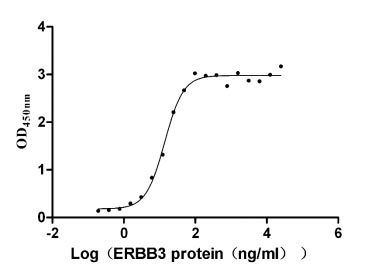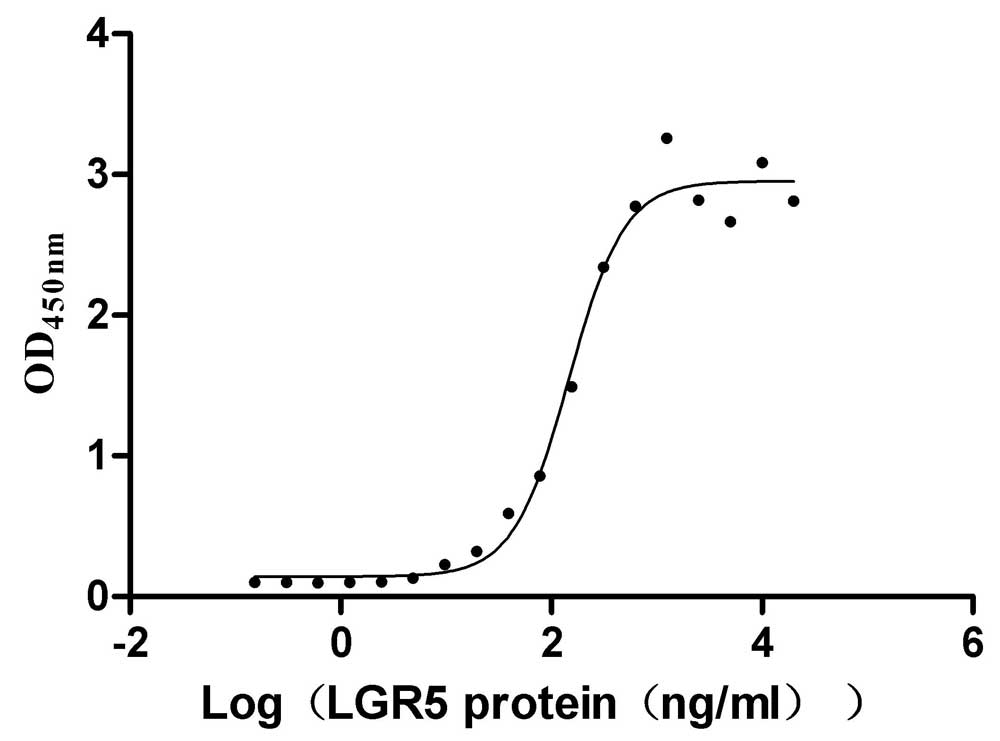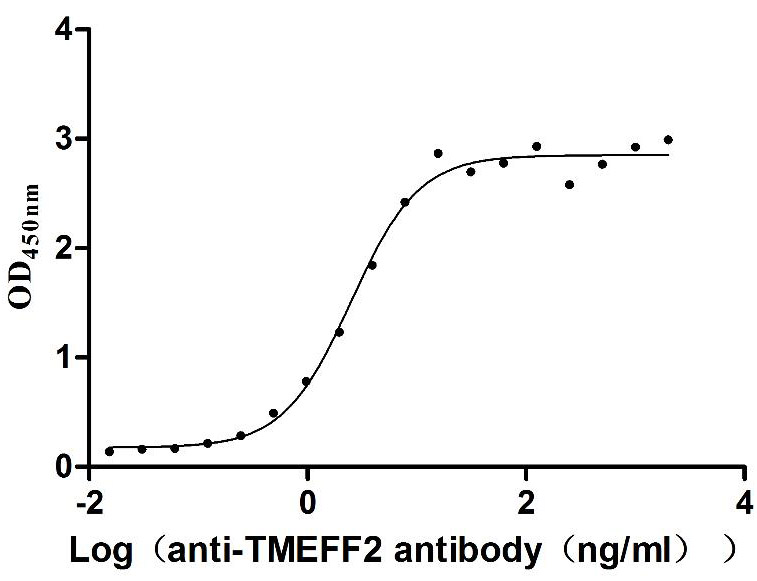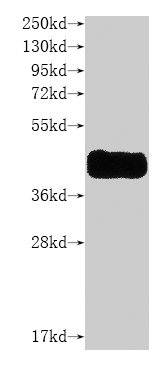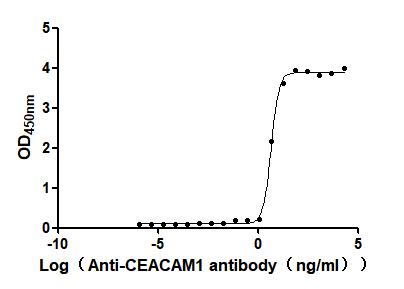Recombinant Human Gastrin-releasing peptide receptor (GRPR), partial
-
货号:CSB-YP009943HU
-
规格:
-
来源:Yeast
-
其他:
-
货号:CSB-EP009943HU
-
规格:
-
来源:E.coli
-
其他:
-
货号:CSB-EP009943HU-B
-
规格:
-
来源:E.coli
-
共轭:Avi-tag Biotinylated
E. coli biotin ligase (BirA) is highly specific in covalently attaching biotin to the 15 amino acid AviTag peptide. This recombinant protein was biotinylated in vivo by AviTag-BirA technology, which method is BriA catalyzes amide linkage between the biotin and the specific lysine of the AviTag.
-
其他:
-
货号:CSB-BP009943HU
-
规格:
-
来源:Baculovirus
-
其他:
-
货号:CSB-MP009943HU
-
规格:
-
来源:Mammalian cell
-
其他:
产品详情
-
纯度:>85% (SDS-PAGE)
-
基因名:
-
Uniprot No.:
-
别名:BB2; Bombesin BB2 receptor; bombesin receptor 2; Gastrin Releasing Peptide Receptor; Gastrin-releasing peptide receptor; GRP preferring bombesin receptor; GRP R; GRP-preferring bombesin receptor; GRP-R; Grp/bombesin receptor; Grpr; GRPR_HUMAN
-
种属:Homo sapiens (Human)
-
蛋白长度:Partial
-
蛋白标签:Tag type will be determined during the manufacturing process.
The tag type will be determined during production process. If you have specified tag type, please tell us and we will develop the specified tag preferentially. -
产品提供形式:Lyophilized powder
Note: We will preferentially ship the format that we have in stock, however, if you have any special requirement for the format, please remark your requirement when placing the order, we will prepare according to your demand. -
复溶:We recommend that this vial be briefly centrifuged prior to opening to bring the contents to the bottom. Please reconstitute protein in deionized sterile water to a concentration of 0.1-1.0 mg/mL.We recommend to add 5-50% of glycerol (final concentration) and aliquot for long-term storage at -20℃/-80℃. Our default final concentration of glycerol is 50%. Customers could use it as reference.
-
储存条件:Store at -20°C/-80°C upon receipt, aliquoting is necessary for mutiple use. Avoid repeated freeze-thaw cycles.
-
保质期:The shelf life is related to many factors, storage state, buffer ingredients, storage temperature and the stability of the protein itself.
Generally, the shelf life of liquid form is 6 months at -20°C/-80°C. The shelf life of lyophilized form is 12 months at -20°C/-80°C. -
货期:Delivery time may differ from different purchasing way or location, please kindly consult your local distributors for specific delivery time.Note: All of our proteins are default shipped with normal blue ice packs, if you request to ship with dry ice, please communicate with us in advance and extra fees will be charged.
-
注意事项:Repeated freezing and thawing is not recommended. Store working aliquots at 4°C for up to one week.
-
Datasheet :Please contact us to get it.
相关产品
靶点详情
-
功能:Receptor for gastrin-releasing peptide (GRP). Signals via association with G proteins that activate a phosphatidylinositol-calcium second messenger system, resulting in Akt phosphorylation. Contributes to the regulation of food intake. Contributes to the perception of prurient stimuli and transmission of itch signals in the spinal cord that promote scratching behavior, but does not play a role in the perception of pain. Contributes primarily to nonhistaminergic itch sensation. Contributes to long-term fear memory, but not normal spatial memory.
-
基因功能参考文献:
- Expression of Gastrin-Releasing Peptide Receptor in Breast Cancer and Its Association with Pathologic, Biologic, and Clinical Parameters PMID: 28280221
- GRP-R regulates glucose metabolism in neuroblastoma by modulating HIF-1alpha, PDK4 and PDP2. PMID: 25630799
- BBS caused a significant increase in Shh gene transcription and protein secretion that was dependent on BBS-induced GPCR/Galphaq-//Rho mediated activation of nuclear factor kappaB (NFkappaB), which can stimulate a NF-kappaB response element in the Shh gene promoter PMID: 24747971
- GRPR is highly expressed in epidermoid carcinoma of the anal canal, suggesting this receptor might have a role in anal carcinogenesis. PMID: 23958544
- a key mechanism for GRPR-regulated colon cancer cell migration through the Galpha13-PRG-RhoA-ROCK pathway. PMID: 24958816
- GRPR expression was more pronounced in an advanced-stage lung cancer PMID: 24377816
- integrin ss1 subunit critically regulates GRP-R-mediated neuroblastoma cell migration and invasion PMID: 23889963
- Elevated buccal GRPR espression was significantly associated with squamous cell carcinoma of the head and neck. PMID: 22431275
- These findings highlight the role of GRPR signaling in sepsis outcome. PMID: 22735756
- Protein kinase C is critically responsible for rapid VEGF secretion by gastrin-releasing peptide receptor signaling in neuroblastoma cells PMID: 23155231
- High GRPR is associated with prostate carcinoma. PMID: 22248281
- Bronchial gastrin-releasing peptide receptor expression was significantly associated with lung cancer in a multivariable logistic regression model adjusted for age, sex, smoking status and pulmonary function. Lung cancer risk was not modified by sex. PMID: 22296774
- Concomitant vascular GRP-receptor and VEGF-receptor expression in human tumors provides molecular basis for dual targeting of tumoral vasculature. PMID: 21605611
- This study is the first to confirm the presence of gastrin-releasing peptide receptor in human glioma specimens and normal human neurons. PMID: 20211708
- The results suggest that brain-derived neurotrophic factor/TrkB and cAMP phosphodiesterase-4, but not the gastrin-releasing peptide receptor, regulate the viability of medulloblastoma cells. PMID: 19642024
- hGRP-R activation stimulated sustained cyclic AMP response element binding protein (CREB) phosphorylation and transactivation in duodenal cancer cells through a protein kinase C and partially p38 mitogen-activated protein kinase-dependent pathway. PMID: 12220644
- Bombesin-dependent activation (through GRP receptor) of the transcription factor Elk-1 and significant increase of cell proliferation in prostate cancer cell lines PMID: 12409226
- accumulation of mutations within the GRPR gene allows for the dedifferentiation of tumor cells within any particular colon cancer; poorly-differentiated tumor cells within any individual cancer may arise clonally from better-differentiated precursors PMID: 12720295
- Increased gastrin-releasing peptide (GRP) receptor expression in small cell lung cancer cells confers sensitivity to [Arg6,D-Trp7,9,NmePhe8]-substance P (6-11)-induced growth inhibition PMID: 12771999
- The expression of GRP-R in uterine tissue during specific phases of the cycle suggests a timely precise physiological action of GRP in these targets; in certain uterine neoplasms, the GRP-R overexpression may contribute to tumor development PMID: 15941862
- Gastrin-releasing peptide receptor mediates activation of the epidermal growth factor receptor in lung cancer cells PMID: 15967120
- GRP appears to rescue NSCLC cells exposed to gefitinib through release of amphiregulin and activation of the Akt pathway, suggesting GRPR and/or EGFR autocrine pathways in NSCLC cells may modulate therapeutic response to EGFR inhibitors. PMID: 17349623
- The large amounts of GRP-receptors in ovarian tumor vessels suggest a role in tumoral vasculature and possibly angiogenesis. PMID: 17726264
- There is a potential role of C6S and L181F mutations on GRPR function, and possibly in the pathogenesis of the autistic disorders. PMID: 18393381
- CREB is a critical regulator of human GRP-R expression in gastrointestinal cancer and might be activated through different upstream intracellular pathways PMID: 18483184
- Widespread GRPR expression in human cervical cancer. PMID: 18497507
- These findings demonstrate that GRP and GRP-R have important oncogenic properties beyond their established mitogenic functions. PMID: 18753628
- Gastrin-releasing peptide receptor is expressed in the vast majority of lymph node metastases and in 52.9% of bone metastases of prostate cancer. PMID: 19343734
- High expression of gastrin-releasing peptide receptors is associated with the vascular bed of urinary tract cancers. PMID: 19478282
- In MDA-MB-231 breast cancer cells, GRP-R and EGF-R synergize to regulate cell migration and IL-8 expression, but not cell proliferation. PMID: 19631337
显示更多
收起更多
-
亚细胞定位:Cell membrane; Multi-pass membrane protein.
-
蛋白家族:G-protein coupled receptor 1 family
-
组织特异性:Highly expressed in pancreas. Also expressed in stomach, adrenal cortex and brain.
-
数据库链接:
HGNC: 4609
OMIM: 305670
KEGG: hsa:2925
STRING: 9606.ENSP00000369643
UniGene: Hs.567282
Most popular with customers
-
Recombinant Human Receptor tyrosine-protein kinase erbB-3 (ERBB3), partial (Active)
Express system: Mammalian cell
Species: Homo sapiens (Human)
-
Recombinant Human R-spondin-1 (RSPO1), partial (Active)
Express system: Mammalian cell
Species: Homo sapiens (Human)
-
Recombinant Human Tomoregulin-2 (TMEFF2), partial (Active)
Express system: Mammalian cell
Species: Homo sapiens (Human)
-
Recombinant Human C-C chemokine receptor type 8 (CCR8)-VLPs (Active)
Express system: Mammalian cell
Species: Homo sapiens (Human)
-
Express system: Mammalian cell
Species: Homo sapiens (Human)


